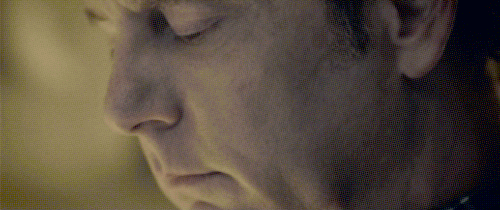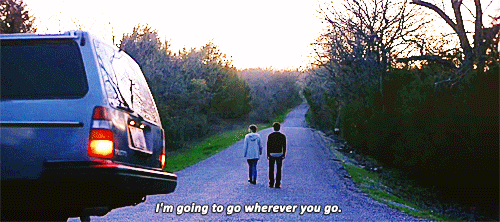Recently, after my musings about my affinity for sci-fi romances, I had an epiphany about one of my all time faves:
Upstream Color.
A couple years back, I wrote this long and disjointed piece about it because – while I loved this shit outta this film – I didn’t quite “get” it. The music was fantastic. The cinematography was next-level. The acting was superb. But, when I tried to explain what it was a metaphor for, I kept falling Katt Williams level short. My first thought was, “OH. Definitely addiction.” But that felt too simple – especially since I couldn’t identify the how’s and why’s when I broke down relevant details from the movie itself. Then, finally, it dawned on me. After two years. Of course. It’s a metaphor for a spiritual awakening! Presumably against religion (and mayhaps other cultural programming we blindly follow, too).
And here’s 7 reasons why:
1.) Hypnotic indoctrination

(Halo metaphor?)
When Kris (and Jeff) get kidnapped and fed that Scopolamine-like worm, they’re forced to read from a book and memorize the lines taken out of context (not unlike what happens with the ones sitting in front of you in the pews at church). All night long while she gets robbed (literally and metaphorically of her free will and soul), she’s trading her spirit for this new meaningless routine while being made to believe ridiculous things like her food’s all poisoned or the thief’s head is made of solar stuff (as in the gif above – so that she can’t look at him and identify him; much like we can’t question the infallible pope.)
2.) Manipulation by an unseen power

Once the worm gets porcine transplanted by that farmer guy (“Shepherd”, mayhaps? Playing god?), it’s as if their souls are collected there in that pig, ever to be intervened with by the farmer himself. He steps in and out of their lives, rarely speaking. It’s as if the farmer represents religion as a concept. After the indoctrination is over, the idea is what remains: the guilt, the lack of creativity, the stagnation, going through the motions but never really living for fear of stepping outside of the lines – like the dissonant chord the farmer strikes when Kris breaks a thread at work.
3.) Sound

That dissonant chord was jarring for the farmer because sound is the way he controls his population of stolen souls. Even this theme is reminiscent of ancient religious texts. I’ve heard repeatedly that the whole “In the beginning was the word” was actually something more like “In the beginning there was the sound. And the sound was Om”. (The idea being that sound is god). By playing certain sounds around the pigs (holding the souls), the farmer thus is playing god and affecting the actual people.
4.) Malaise and meaningless rituals

The paper links. The copying of text. Stacking M&M’s. All are traditions that neither Kris nor Jeff could’ve answered or explained anymore easily than a typical Catholic could if you asked them, “Why’re we standing in line to eat biscuits? Why not just have a Kraft table like at movie sets?”, “Why kneel instead of bow or do a prayer stretch?”, “Why isn’t mass interactive instead of didactic?”, “Why don’t you get to wear the robe and give the lecture? Why’s he get to do it?”, “Why are we solemn? Why are we not celebrating and hugging?” Or how about: “What were you even thinking of as you recited words under your breath while thumbing that long beaded piece of jewelry?”
Nothing, for most folk. It’s just a passionless ritual.
5.) The pig

In the bible, Jesus casts demons into a pig – which is deemed a holy creature in Christianity. Though the de-worming imagery in Upstream was more like that intestine tugging scene from “The Cell”, the symbolism for using the pig like some Catholic receptacle for essence-theft was beyond strong here.
6.) Stigmata, Fear, and Love.

After the worms have been taken out, the scars remain in the feet of both Kris and Jeff, not unlike stigmata endured by Jesus in the biblical story that may or may not be myth. While the two of them have no recollection of the event itself, the lesions are familiar enough that when Kris wakes up next to Jeff after their first night together, she touches them – and he recoils though still asleep. What I love about this scene is how they juxtapose their lovemaking against the pigpen itself, because this is the closest to their actual souls they’ve been in ages since their hypnotic indoctrination. Unlike the apathetic ritual to which they’ve been bound (like religions that function off of guilt and fear), love is what’s driving them here. And that love becomes strong enough that the farmer has to try to fight them off – even drowning the piglet offspring that come of it (anything outside the lines doesn’t work under the infallible magisterium).
7.) Spiritual Awakening

Once Kris and Jeff have a glimpse of “another way” of living, they begin to wake up to the fact that something’s not right. And they can’t ignore it. Even though they can’t put their fingers on what it is, they do their research until something synchs up (in the movie, they found the audio the farmer had been recording – the IRL parallel could be doing historical research or even just meditative practices to decide what’s believable and real versus what’s not), and then go to the source. Their murder of the farmer is symbolic of eschewing formative belief systems that no longer serve you – since that’s all he ever really was. A concept. It also breaks them ultimately from seeking outside of themselves for a personal Jesus (which they’d found in each other when they were still spellbound by the farmer – hence that gif above, exemplifying the aimless following of someone just as lost as you are). When I think of it this way, the title finally makes sense. Because when you go with the grain – with the stream’s flow – the color feels blue, drab and mundane.
But fight your way upstream – and a golden, yellow true heaven of your own making awaits.

Now that I love this movie even more, I’ll obviously have to watch it again this week.
(I fully expect to receive an explosion of confetti and a prize for my millionth time watching it.)